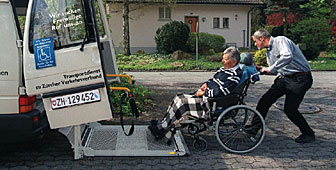Parliament debates stronger rights for disabled

Disabled people in Switzerland are pushing for a stronger legal status as parliament discusses a series of anti-discrimination measures.
The country has an estimated 700,000 physically or mentally disabled people, with many of them feeling discriminated despite an equal rights clause in Switzerland’s constitution.
Disabled people continue to suffer from poor access to public buildings and services, including railways, restaurants or sports facilities.
Only about 30 per cent of these public buildings are currently accessible to wheelchair users.
The visually impaired and people hard of hearing also report significant practical barriers in every day life.
Barbara Marti, from the self-help group Agile, says even simple tasks can become an insurmountable challenge.
“It is very difficult for a blind person to buy a train ticket or get money from a cash dispenser. Everything is managed by [brail-less] touch screens, ” she told swissinfo.
Work and education
Marti said children with disabilities also battle for functional access to regular schools, locking some teenagers out of apprenticeships and the prospect of work.
The problem is no different for Switzerland’s adult disabled population, where skills often remain undeveloped, leading to unemployment, Marti said.
“We just want the same access as non-disabled people have to everything. We do not want more,” Marti said.
Marc Suter, a wheelchair-bound member of parliament, says increased efforts are needed to promote the integration of disabled people into schools and within the workplace.
“We believe that employees who are disabled should get a fair chance, and if necessary, take their fight to court,” Suter told swissinfo.
While the disabled are relatively well-cared for under Switzerland’s social security system – chiefly through a state insurance scheme – Suter says basic legal rights lag behind many industrialised countries, including the United States.
Suter says parliament should aim to bring Swiss laws in line with standards set by Britain and Scandinavian countries.
Setback in parliament
However, hopes that parliament would broaden legal rights for the disabled, suffered a setback this week.
The House of Representatives limited potential compensation claims for discrimination to a maximum of SFr5,000 ($3,195).
Victims of discrimination will also be blocked from taking private employers to court.
The House also debated measures to enforce stricter building codes.
Opponents argued a wide-ranging right to seek compensation would lead to huge numbers of court cases and unfairly burden employers and house owners.
The House debate on the draft law wrapped up on Tuesday, paving the way for the Senate to take up the issue again later this year.
Alongside the parliamentary debate is a people’s initiative pushing for broader rights.
The initiative will be put to a national vote.
by Urs Geiser and Jonathan Summerton

In compliance with the JTI standards
More: SWI swissinfo.ch certified by the Journalism Trust Initiative

You can find an overview of ongoing debates with our journalists here. Please join us!
If you want to start a conversation about a topic raised in this article or want to report factual errors, email us at english@swissinfo.ch.